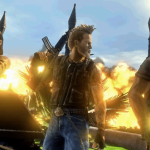 History
History  History
History  Health
Health 10 Everyday Activities That Secretly Alter Consciousness
 History
History Top 10 Historical Disasters Caused by Someone Calling in Sick
 Animals
Animals 10 New Shark Secrets That Recently Dropped
 Movies and TV
Movies and TV 10 Forgotten Realities of Early Live Television Broadcasts
 Technology
Technology 10 Stopgap Technologies That Became Industry Standards
 Weird Stuff
Weird Stuff 10 Wild Facts About Taxidermy That You Probably Didn’t Know
 Travel
Travel 10 Beautiful Travel Destinations (That Will Kill You)
 Miscellaneous
Miscellaneous 10 Modern Marriage Rituals Born from Corporate Branding
 Weird Stuff
Weird Stuff Ten Bizarre Visions of 2026 from Fiction
 History
History 10 “Modern” Problems with Surprising Historical Analogs
 Health
Health 10 Everyday Activities That Secretly Alter Consciousness
 History
History Top 10 Historical Disasters Caused by Someone Calling in Sick
Who's Behind Listverse?

Jamie Frater
Head Editor
Jamie founded Listverse due to an insatiable desire to share fascinating, obscure, and bizarre facts. He has been a guest speaker on numerous national radio and television stations and is a five time published author.
More About Us Animals
Animals 10 New Shark Secrets That Recently Dropped
 Movies and TV
Movies and TV 10 Forgotten Realities of Early Live Television Broadcasts
 Technology
Technology 10 Stopgap Technologies That Became Industry Standards
 Weird Stuff
Weird Stuff 10 Wild Facts About Taxidermy That You Probably Didn’t Know
 Travel
Travel 10 Beautiful Travel Destinations (That Will Kill You)
 Miscellaneous
Miscellaneous 10 Modern Marriage Rituals Born from Corporate Branding
 Weird Stuff
Weird Stuff Ten Bizarre Visions of 2026 from Fiction
10 Video Game Antagonists with Surprisingly Redeemable Motives
Antagonists serve an important role in storytelling, and learning the motivations of a villain can be a good way to wrap up a story in a satisfying way. This is true for all media, and video games are no exception. A sympathetic villain can add emotional depth and conflict to a game. For example, the final boss fight is coming up. A player might begin button-mashing through the villain’s monologue, scanning bits of important information and being regaled with seemingly endless backstory.
But wait! Did he just say he defrauded this oil company to pay for his mother’s cancer treatment? Maybe that changes how the audience feels about him. There are more than a few antagonists who give a somewhat valid reason for what they do. It can be an interesting thought experiment to decide what we ourselves might do in any of these given situations.
Related: Top 10 Movie Villains Who Should Have Won
10 Thomas Mutton (Catherine)
Catherine is a unique blend of narrative and puzzle elements themed around romance, sexuality, relationships, and death. Lately, men have been experiencing nightmares where they are trapped on a staircase, endlessly traveling upward, and they must scramble to the top to survive the night. Those who fall die mysteriously in their sleep. As it turns out, this is caused by Thomas “Boss” Mutton, the owner of the Stray Sheep bar. He is carrying out the will of a higher being by choosing men to send to the Great Trials each night from among the patrons of the bar.
When confronted, Boss finally reveals why he sends these men. He speaks with his customers and singles out men in their late 20s and 30s with relationship troubles. His purpose is to stop these men from hindering the population by lowering the birth rate, an issue that is prevalent in Japan.
His reasoning is that these weak-willed and non-committal men are wasting the time of young women who wish for families and children. Either they will survive the nightmare and learn to value what they have, or they will die in the night, leaving the young women in their lives free to move on and start a family. While this level of interference is certainly not excusable, the men he selects for the Great Trials are often not good people, making his selection at least somewhat understandable.[1]
9 N (Xenoblade Chronicles 3)
A more recent release, Xenoblade Chronicles 3, has a great number of antagonists throughout the game. The most notable and arguably intriguing of the lot is the mysterious “N.” He is clearly a mirror of the player character Noah from the jump, but his motivations are veiled through several encounters. Noah and Mio are an inseparable pair of protagonists who face him down together, and they discover that N also has a partner mirroring Mio, known as “M.”
N and M are Noah and Mio from another reality. The only way they can protect the endless amount of time they have together is to ensure that nothing in this reality changes. Noah and Mio threaten that with their actions, so N and M are trapped in an endless loop of hunting them down so that they can keep their time together from running out. N is eventually defeated by the pair, with the help of M. Still, Noah reflects that had he been given the choice, he is not sure he would be able to turn down eternity with his love either.[2]
8 Morris (Stardew Valley)
The premise of Stardew Valley is simple. Your character must move to a tiny town to take over the farm your grandfather left you, and you must nurture it in the hopes of turning a profit and improving the town. When you move in, you are greeted with the news that a JojaMart has opened in town, and many of the locals are not happy about it. Through the main route of the game, you work together with forest creatures to bring the town to prosperity and send the JojaMart manager, Morris, packing.
Alternatively, you can choose to get a membership at the Mart and enjoy all the offerings and conveniences of the store. Doing so does not really change the town, showing that perhaps many of the townspeople’s fears were unjustified.[3]
7 Alma (F.E.A.R.)
How much trauma must this little girl endure at the hands of scientists? F.E.A.R. is a horror game with a first-person shooter tilt. The player is left dealing with the fallout of a lifetime of horrific experiments on a girl named Alma Wade. She was being studied and used for her psychic powers and forcefully used for breeding.
Is it truly any wonder that, eventually, those psychic powers would be turned on anyone in her path? It is hard not to be sympathetic in this situation, even as you pray her gaze will not turn on you. She may be the antagonist, but it seems the true villains were Armacham Technology Corporation for the atrocities they committed, turning Alma into the fearsome being she is now.[4]
6 Fireflies (The Last of Us)
The Last of Us is a heartwarming game where Joel, the protagonist, informally adopts a young teen girl named Ellie as they work together to survive the zombie-infested, post-apocalyptic wasteland that surrounds them. The game does an excellent job of building the rapport between these two characters, making the audience feel fiercely protective of the pair. These feelings culminate when Ellie is suddenly kidnapped by a group called the Fireflies.
Joel fights his way to save her, ending the lives of many Fireflies. On the way to retrieve her, he eventually kills their leader. He saves Ellie from being operated on and experimented on, but there is a twist. Ellie is immune to the zombie virus that has infected almost everyone. The Fireflies were going to use her to create a cure that could help save humanity. There is a chance that her death could help bring about the restoration of Earth.
However, Joel makes the decision that it is not worth it; he must rescue Ellie. But there is certainly an argument to be made in favor of having let the Fireflies have her. Are the needs of the many more important than the needs of the few? This is the very basis of Utilitarianism, so it’s safe to say the answer is debatable.[5]
5 Josh (Until Dawn)
What could possibly go wrong with trying to prank someone during a secluded cabin stay in the mountains? A lot more than this young group of friends predicted. In Until Dawn, the game begins with the friend group tormenting twins Beth and Hannah with a cruel prank, driving them into the woods. In their panic, they fall off a cliff to their deaths.
Josh, the older brother of the twins, invites the group back the following year to participate in a party remembering the twins. While there, the group is tormented by what they think is a serial killer. Josh reveals that he was pranking them in increasingly horrific ways as a form of revenge for his sisters’ deaths. He was clearly deeply disturbed by the tragic accident that took his sisters from him and blames the group. Other events cause group members to be injured or die. Still, Josh never purposely did anything except try to scare the group out of anger.[6]
4 Comstock (Bioshock Infinite)
Comstock is the main antagonist of Bioshock Infinite, while Booker is the protagonist. The two characters are one and the same, revealed to have been reflections of each other from parallel universes. Comstock is the result of Booker being left unrepentant of his crimes. Booker must undergo a baptism to cleanse himself of these sins. Most of the things that Comstock does throughout the game are inexcusable, but one choice he makes stands out to me in particular.
Comstock is unable to have children in his timeline, while in a parallel world, Booker has a daughter named Anna. Comstock travels between dimensions to take Anna as his own daughter and renames her Elizabeth. Booker eventually recognizes Elizabeth as his daughter Anna because her finger was severed when taken from his world.
It is understandable that Comstock may not have been able to bear the thought of not having his own daughter. His logic may have concluded that Anna is technically his daughter, albeit from another dimension, so he may have felt justified in retrieving her.[7]
3 The Queen (OFF)
OFF is a surreal indie game from France featuring a main character known only as “The Batter.” He is known as such because he carries a baseball bat with him that he uses to “cleanse” various zones. While many elements of the game are left purposely vague, the narrative becomes clearer when approaching the end.
The Queen is the penultimate boss you must face in order to finish cleansing the zones. She tries to reason with you, appealing to the player directly and hinting that The Batter has had foul intentions from the start. Your perception shifts, and you realize that instead of cleansing zones, you have been blindly committing a murderous rampage. The Queen, although your enemy who must be felled, is simply trying to protect everyone from your warpath.[8]
2 Skull Kid (Majora’s Mask)
The Legend of Zelda: Majora’s Mask is widely regarded as one of the darkest and most difficult Zelda games. Link is fighting against a three-day time-loop to keep the skull kid from bringing the moon down to crush the earth. Skull kid only has this power because he has stolen the legendary and powerful Majora’s Mask from the happy mask salesman. The dark power of the mask is corrupting him from the inside and is causing the destruction.
In an earlier game in the series, The Legend of Zelda: Ocarina of Time, Navi has text revealing that skull kids are unhappy because they no longer have faces. Skull kid lives out his days lonely in the Kokiri forest, so it makes sense that he is drawn to Majora’s Mask. It likely called out to him with dark power, offering him a face and the ability to do whatever he wanted. This is a tempting offer, especially for someone as lonely as the skull kid.[9]
1 Hades (Hades)
Hades is the titular antagonist of the game Hades. You play as Zagreus, his strong-willed son. Zagreus is forbidden from leaving the Underworld but is determined to do so. He rebels at every turn against his stubborn father and must fight him again and again to earn the right to step out onto the earth’s surface. When he is finally able to beat his father in battle, Zagreus leaves the Underworld only to make a few important discoveries.
His father was hiding his real mother, Persephone, from him, and Zagreus cannot survive for very long on the surface. Hades may be a distant, cold, and abrasive father, but he has been trying to protect his family all this time. He loves Persephone and his son Zagreus. He may have been misguided about his methods of protection by keeping them apart, but he was operating under fear of the Olympians. The game ends with the family working things out and finally growing close again. Hades may have been the antagonist, but by the end of the game, his actions become understandable.[10]








